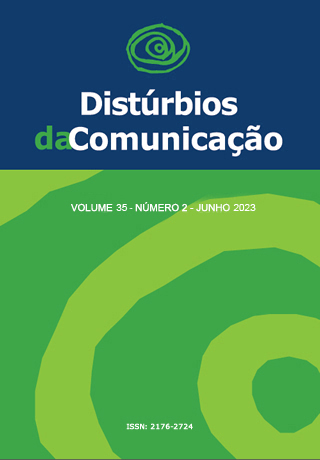O empoderamento de indivíduos com deficiência auditiva:
revisão de literatura
DOI:
https://doi.org/10.23925/2176-2724.2023v35i2e56880Palavras-chave:
Empoderamento, Advocacia e saúde, Perda auditiva, FonoaudiologiaResumo
Introdução: o empoderamento está atrelado à autoadvocacia e a aprendizagem de ambos por pessoas com deficiência é fundamental para que essas conquistem o poder pessoal de gerir seus destinos. Objetivo: elencar as estratégias de intervenção utilizadas para o empoderamento do indivíduo com deficiência auditiva. Metodologia: realizou-se busca nas bases de dados Literatura Latino-americana e do Caribe em Ciências da Saúde (LILACS), Public Medicine Library (PubMed) e na ferramenta de buscas Google Acadêmico, por meio do cruzamento de descritores previamente selecionados. Foram incluídos estudos que avaliassem, propusessem estratégias ou discutissem sobre o empoderamento do indivíduo com deficiência auditiva. Resultados: Foram encontrados 186 estudos. Destes, 18 foram lidos na íntegra e 11 foram incluídos nesta revisão. O ano de publicação dos estudos variou de 2011 a 2021. Os estudos incluídos discutem, em algum momento, sobre o empoderamento de indivíduos com deficiência auditiva, porém a minoria propõe e relata resultados de estratégias de intervenção para trabalhar esse aspecto. Os estudos propõem que o empoderamento inicie por meio dos pais, nos centros de intervenção precoce. O empoderamento dos adolescentes com deficiência auditiva faz-se extremamente necessário e estratégias de intervenção em grupo podem ser benéficas para este fim. Somente um estudo brasileiro propôs uma estratégia de intervenção para essa população. Conclusão: O empoderamento deve começar por meio dos pais, logo após o diagnóstico da deficiência auditiva. Adolescentes podem tornar-se modelos para seus pares quanto a esse aspecto e adultos devem ser empoderados antes da adaptação do dispositivo de escuta.
Downloads
Referências
Carvalho SR. As contradições da promoção à saúde em relação à produção de sujeitos e a mudança social. Ciênc Saúde Coletiva. 2004; 9(3): 669-78. doi: 10.1590/S1413-81232004000300018.
Carvalho SR. Os múltiplos sentidos da categoria “empowerment” no projeto de promoção à saúde. Cad Saúde Publica. 2004; 24(4): 1088-95. doi: 10.1590/S0102-311X2004000400024.
Cesarino CB, Sciarra AMP. Empoderamento na saúde. Arq Ciênc Saúde. 2017; 24(3): 01-02.
Souza JM, Tholl AD, Córdova FP, Heidemann ITSB, Boehs AE, Nitschke RG. Aplicabilidade prática do empowerment nas estratégias de promoção da saúde. Ciênc Saúde Coletiva. 2014;19(7): 2265-76. doi: 10.1590/1413-81232014197.10272013.
Dantas TC. Vivências de empoderamento e autoadvocacia de pessoas com deficiência: um estudo no Brasil e no Canadá. Educ Unisinos. 2017; 21(3): 336-44. doi: 10.4013/edu.2017.213.13489.
Warner-Czyz AD, Loy BA, Evans C, Wetsel A, Tobey EA. Self-esteem in children and adolescents with hearing loss. Trends Hear. 2015; 19: 1-12. doi: 10.1177/2331216515572615.
Silva RLF, Carneiro LA, Nery DB, Duarte LA, Moret ALM, Salimon A, et al. Autoadvocacia como prática de empoderamento de adolescentes com deficiência auditiva: um estudo-piloto. Audiol Commun Res. 2020; 25: e2324. doi: 10.1590/2317-6431-2020-2324.
Munoz-Bael IM, Ruiz MT. Empowering the deaf. Let the deaf be deaf. J Epidemiol Community Health. 2000; 54(1):40-4. doi: 10.1136/jech.54.1.40.
Gotowiec S, Larsson J, Incerti P, Young T, Smeds K, Wolters F et al., Understanding patient empowerment along the hearing health journey. Int J Audiol. 2021; 61(2):148-58. doi: 10.1080/14992027.2021.1915509
Kulkarni KA, Gathoo VS, Parent Empowerment in Early Intervention Programs of Children with Hearing Loss in Mumbai, India. DCIDJ. 2017; 28(2): 45-58. doi: 10.5463/DCID.v28i2.550.
JCIH: Joint Committee on Infant Hearing. Year 2019 Position Statement: Principles and Guidelines for Early. The Journal of Early Hearing Detection and Intervention. 2019; 4(2): 1–44. [Acesso em 17 Dez 2021]. Disponível em: https://digitalcommons.usu.edu/cgi/viewcontent.cgi?article=1104&context=jehdi
Ciciriello E, Bolzonello P, Marchi R, Falzone C, Muzzi E, Orzan E. Empowering the family during the first months after identification of permanent hearing impairment in children. ACTA Otorhinolaryngol. 2016; 36(1): 64-70; doi: 10.14639/0392-100X-1071.
Sexton J. Empowering adolescents who are deaf and hard of hearing. N C Med J. 2007;78(2):129-30. doi: 10.18043/ncm.78.2.129.
Resende MC, Barbos KB. Gincana inclusiva: protagonismo, empoderamento e visibilidade das pessoas com deficiência. Pesqui Prát Psicossociais. 2018;13(4):1-12.
Brasil. Lei nº 8.742, de 7 de dezembro de 1993. Dispõe sobre a organização da Assistência Social e dá outras providências. 1993. [Acesso em 17 Dez 2021]. Disponível em: http://www.planalto.gov.br/ccivil_03/leis/l8742.htm
Cardozo PS. Benefício de prestação continuada - BPC: o desafio do empoderamento junto às pessoas com deficiência e suas famílias no município de Forquilhinha-SC. Rev Iniciaç Cient. 2011; 9(1): 142-55.
WHO: World Health Organization. World report on hearing. 2021. [Acesso em 17 Dez 2021]. Disponível em: https://www.who.int/publications/i/item/world-report-on-hearing
Brasil. Portaria nº 2.073, de 28 de setembro de 2004. Institui a Política Nacional de Atenção à Saúde Auditiva. 2004. [Acesso em 17 Dez 2021]. Disponível em: https://bvsms.saude.gov.br/bvs/saudelegis/gm/2004/prt2073_28_09_2004.html
Vieira GI. Política Nacional de Atenção à Saúde Auditiva: o caso do município de São Paulo [Dissertação]. São Paulo (SP): Universidade de São Paulo. Programa de Pós-Graduação em Saúde Pública; 2013.
Bruce SM, Parker AT. Young deafblind adults in action: becoming self-determined change agents through advocacy. Am Ann Deaf. 2012;157(1):16-26. doi: doi: 10.1353/aad.2012.1607.
Downloads
Publicado
Edição
Seção
Licença
Copyright (c) 2023 Brenda Fontinele de Oliveira, Michele Carolina Celestino da Silva Araújo, Vanessa Luisa Destro Fidêncio

Este trabalho está licenciado sob uma licença Creative Commons Attribution 4.0 International License.









